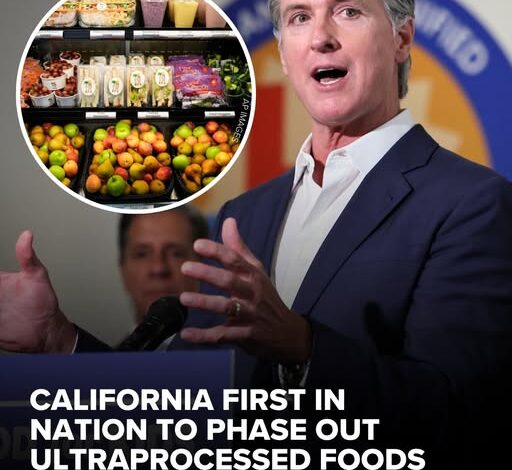NXT California first in nation to legally define, phase out ultraprocessed foods in public schools

Ultraprocessed foods have been linked to serious health risks, especially in children.
On Wednesday, California became the first state in the nation to legally define UPF as it begins to phase them out of K-12 schools, with the goal to officially ban them. It’s part of a landmark legislation, with support from both sides of the aisle, and a signature from Governor Gavin Newsom.
The Golden State has made it a golden rule: no ultraprocessed foods in schools. It’s a first in the nation law aimed to improve the health and nutrition of children.
“It’s a moment that should ignite all of us, regardless of political strife, and it’s a movement that we have a requirement to advance,” Newsom said.
“This is really very simple: food should make our kids healthy. Food should not make our kids sick,” said Scott Faber with the Environmental Working Group.
MORE: California, Washington and Oregon governors form health alliance in rebuke of Trump administration
The governor was joined by his partner Jennifer Siebel Newsom for the announcement in Los Angeles County.
Already the leader in banning artificial food dyes and additives, California lawmakers targeted ultraprocessed foods.
For the first time, AB 1264 legally defines UPF as high in saturated fat, added sugar or sodium and with at least one additive, such as flavor, color, emulsifier or a thickening agent. These are foods high in calories, low in nutrients and with increased chances of health risks — items that are often staples in cafeterias.
“It made absolutely no sense to me,” said Assemblymember Jesse Gabriel. “We don’t love our kids any less than they love their kids in Europe or Asia or Latin America, so why would we offer them less protection from products linked to cancer and cardiovascular disease and reproductive harm?”
MORE: California Gov. Gavin Newsom signs landmark bill creating AI safety measures
Those who oppose the law have concern that the bill limits choice, leads to fewer products available and could create financial burden for school districts.
Although, an analysis of the bill says the cost to schools is unknown, because it’s not known which foods would be eliminated.
Supporters of the bill disagree with concerns.
“We have already built a blueprint and shown what success can look like,” said Jennifer Siebel Newsom. “And while our work is far from over, I have no doubt the California will continue to raise the bar for school food, because the future always happens here first.”
The California Department of Public Health will begin to phase out ultraprocessed foods in 2029. Vendors who provide the food for to the schools have until 2032 to comply with the law.



